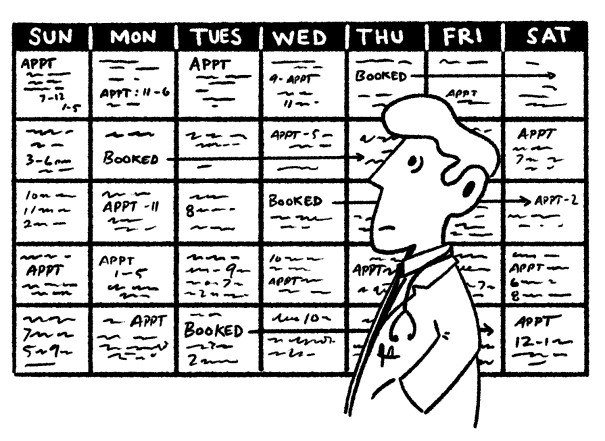Where to Get Medical Care in Philly Besides the Doctor’s Office
Can't get an appointment? Don’t have a doctor? From urgent care to clinics to the pharmacy, here's rundown of places you can turn to for health care when you need it

You’ve got options beyond a traditional doctor’s appointment when you need medical care.
Can’t wait for the next opening in your doc’s schedule? Don’t have a primary-care doctor? (Eighteen percent of us don’t, according to a 2018 city survey.) Here, a rundown of places you can turn to for medical care when you need it.
Phone and Websites
The scoop: Maybe, just maybe, you don’t need that appointment, and a portal message or phone call to the office will suffice. You can also call the state’s free 24/7 nurse line with any medical questions: 1-833-510-4727.
Examples: Nemours Children’s Health has a free symptom-checker on its website offering detailed guidance for common ailments, including whether a visit is needed; many practitioners offer similar help via portal messages.
Good for: When you’re not sure you need a doc or what level of care you might need — urgent care? Specialist? ER? Also good when you suspect you could manage something at home … if you only knew how.
Not good for: Sometimes the doctor just needs to see you to help you.
Payment: Free. Some health systems/practices in the country now charge for portal messaging, but as yet, that isn’t widely practiced in Philly.
Urgent Care
The scoop: A walk-in-friendly model for non-life-threatening illnesses and injuries, without the hassle or expense of a trip to the ER. Most offer appointment times in addition to walk-ins. Often open outside typical doctor office hours.
Examples: Vybe, myDoc, AFC. The big health systems (Temple, CHOP, Christiana, Penn, Jeff, Main Line Health, Nemours, Cooper, etc.) also offer urgent-care centers; ditto Rothman Orthopaedics.
Good for: Acute illnesses (e.g., mild allergic reactions, infections, congestion, food poisoning, pink eye), minor injuries (e.g., bites, sprains, minor breaks or dislocations, minor burn and wound care), lab testing, screenings and X-rays, physicals, vaccinations.
Not good for: Life-threatening injuries or illnesses (e.g., serious head injury, heart attack, stroke); procedures that require anesthesia or surgery.
Payment: Most insurance covers urgent care — check with yours to see who’s in-network. Some centers display prices for “self-pay” visits for the uninsured on their sites.

Scheduling woes / Illustration by James W. Yates
Convenience Clinics
The scoop: A walk-in model similar to urgent care but with more limited services and slightly lower out-of-pocket costs. Often shorter wait times than urgent care and staffed by nurse practitioners and physician assistants. Sometimes there are virtual options, too.
Examples: In some states, you can find convenience clinics in Target, Walmart, some grocers and chain drugstores. In Greater Philly, we’re mostly just talking CVS Minute Clinics.
Good for: Treatment of minor illnesses like ear and sinus infections, flu, colds, UTIs and strep; minor wounds and injuries such as blisters, sprains, back pain (but not severe cuts); vaccinations and STI screenings.
Not good for: More severe injuries or illnesses; anything requiring stitches, CT scans or X-rays.
Payment: Covered by some insurance — check with yours. The uninsured pay out-of-pocket; the CVS website lists prices.
Clinics and Health Centers
The scoop: Several dozen free and low-cost health centers around the city offer a range of services (e.g., primary care, basic dental, optometry, podiatry, behavioral health). Find a comprehensive guide to all of them at phila.gov/primary-care.
Examples: The nine city-run health centers, Esperanza Health Center, Puentes de Salud, Dr. Ala Stanford Center for Health Equity, Wyss Wellness Center. To name just a few.
Good for: Free or low-cost primary care — including preventative care, screenings, managing chronic conditions, medical consults, diagnosing and treating illness and minor injuries — plus, often, pediatrics, ob-gyn services, and behavioral health.
Not good for: Not all clinics are easy to get into — some, not all, have problematic wait times. Services vary by clinic. Check the site and/or call before you go.
Payment: Most clinics accept most insurance (check websites or call) and offer reduced-rate and sliding-scale payments for uninsured patients.

The Pharmacy
The scoop: Great for advice on remedies for minor issues — say, managing pain, what sorts of things might help your coughing toddler, how to find relief from symptoms when you feel like garbage. Your local pharmacist can’t prescribe anything but can tell you what to buy OTC.
Examples: Too many to name. (Try your locally owned neighborhood options.)
Good for: OTC recommendations and guidance; prescription education; vaccinations (sometimes); insights into managing drug side effects or tips on managing chronic conditions like diabetes or pain.
Not good for: Diagnosing or evaluating patients, prescribing medications, or administering exams.
Payment: Free! No co-pay required here.
Video and Telemedicine
The scoop: If you’ve got internet service and a video/audio-enabled device, then you can see a doc. Most providers (including specialists) offer some form of tele-med these days, some even in what are traditionally “off” hours.
Examples: If we’re talking providers that offer services to non-established patients — and offer urgent-care/on-demand services — some include Jefferson’s JeffConnect, Penn Med OnDemand (PMOD), Teladoc, Vybe, Nemours, Main Line Health.
Good for: Consults, diagnoses and treatment for … well, more than you’d think, including lice, rashes, vomiting, sinus infections, flu, strep, UTIs, ear infections, pink eye, bronchitis and more. And again — many specialists also offer telemedicine visits.
Not good for: Emergencies (e.g., excessive bleeding or severe cuts); change in mental status; chest pressure; screenings, labs or scans.
Payment: Coverage and prices vary — check provider websites. Teladoc, for one, starts at $75/visit without insurance. PMOD self-pay visits range from $70 to $395; JeffConnect is $59 for an on-demand call.
The ER
The scoop: The last-resort resort. Because of the expense and long wait times — in Philly, the Inquirer recently reported, ER visits typically take almost an hour longer than the national average — you don’t want to go to the ER unless your condition demands it.
Examples: The Philly region has 36 hospitals providing emergency care.
Good for: Technically, they can treat nearly anything, but the ER is best used for — yup — emergencies (e.g., severe burns, chest pressure, serious injuries/accidents/breaks, extremely high fevers that don’t get better with medicine, allergic reactions).
Not good for: Inexpensive treatment, caring for chronic conditions.
Payment: The average ER cost for the uninsured in Pennsylvania is $1,645. Costs for the insured vary by coverage.
Published as “The Doctor Won’t See You Now” in the May 2024 issue of Philadelphia magazine.


